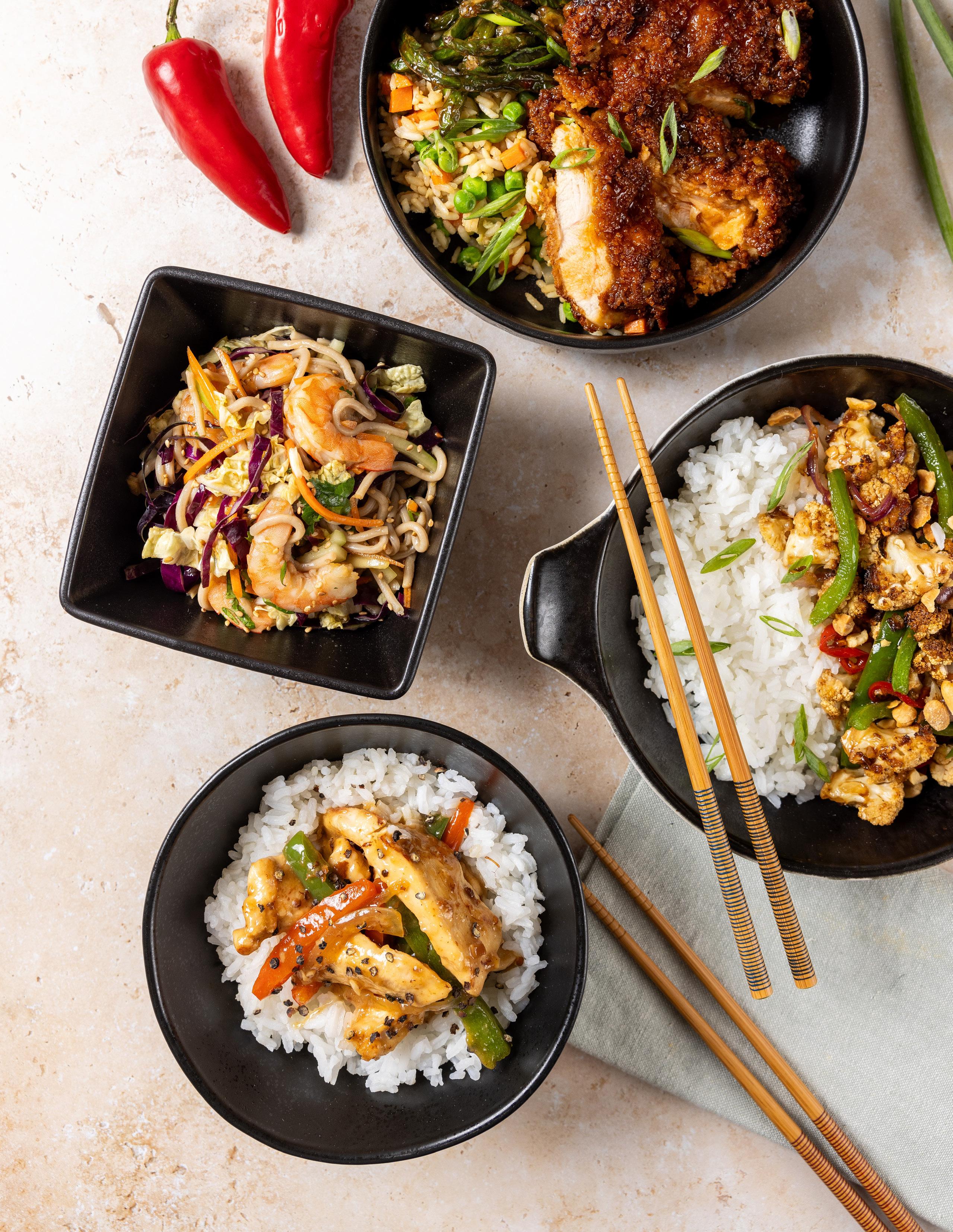THAT’S SO

PLANTFORWARD RECIPES PLUS THE BRIOCHE BUN THAT’S CHANGING THE GAME PUSHING THE BOUNDARIES OF SUSTAINABILITY AT UCI



Crispy Cauliflower Falafel Gyro Recipe #153816.2

THAT’S SO

PLANTFORWARD RECIPES PLUS THE BRIOCHE BUN THAT’S CHANGING THE GAME PUSHING THE BOUNDARIES OF SUSTAINABILITY AT UCI



Crispy Cauliflower Falafel Gyro Recipe #153816.2
At the heart of our mission is a deep passion for food. We are committed to responsible sourcing and large-scale food waste reduction, driving positive change and enriching lives. By embracing the principles of Food is Medicine, we highlight the crucial role that nutritious food plays in promoting health and preventing disease. This commitment is reflected in our sourcing of nutritious and sustainable ingredients that support the health and well-being of those we serve.
Through culinary innovation, collaboration, and partnership, we are dedicated to creating healthier and more sustainable dining experiences that nourish both people and the planet.
HEALING the ONE PLATE AT A TIME PLANET
4. Sustainable Sourcing OUR SUSTAINABILITY PILLARS: HEALING the ONE PLATE AT A TIME PLANET HEALING the ONE PLATE AT A TIME
1. Better Choices
2. Carbon Reduction
3. Menuing with Intention
We’re taking a deep dive into Morrison Healthcare’s commitment to sustainability this Earth Month. Through our Power of Food™ brand, we’re driving change across four key pillars: Better Choices, Carbon Reduction, Menuing with Intention, and Sustainable Sourcing. But what does that really look like in action?
We sat down with Lisa Roberson, National Director of Wellness & Sustainability, and Chef Jeffrey Quasha, Senior Director of Culinary Innovation, to talk about Morrison Healthcare’s role in Compass Group’s larger sustainability initiatives. They break down the what, where, why, and how of making a difference—one meal at a time.
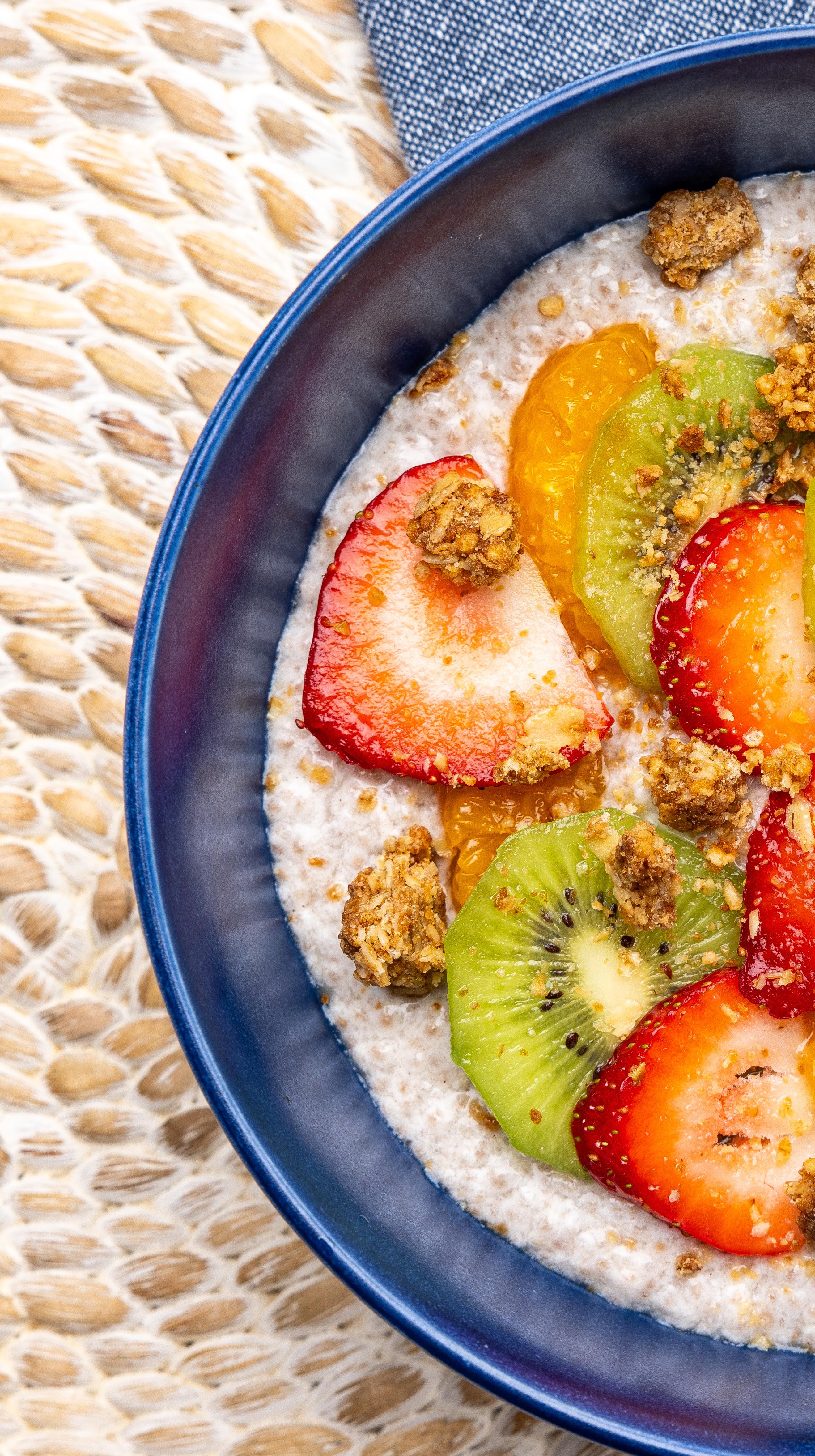


Lisa Roberson National Director of Wellness & Sustainability
What does sustainability mean in the context of Morrison Healthcare?
Lisa: Sustainability means operational efficiency, reducing waste, and making intentional choices that benefit both people and the planet. In healthcare, that means ensuring our foodservice operations are designed to be efficient, lower carbon emissions, and minimize waste while still providing high-quality meals to patients and guests.
Jeffrey: It also means responsible sourcing and reducing food waste at scale. Sustainability isn’t just about what we buy; it’s about how we align our culinary and purchasing efforts to make a global impact. Every ingredient we choose and every process we refine contributes to a more sustainable future.
Where are we seeing the biggest impact in our sustainability efforts?
Lisa: One of our biggest successes has been in food waste reduction. Right now, reducing food waste is our number one priority. We’re also
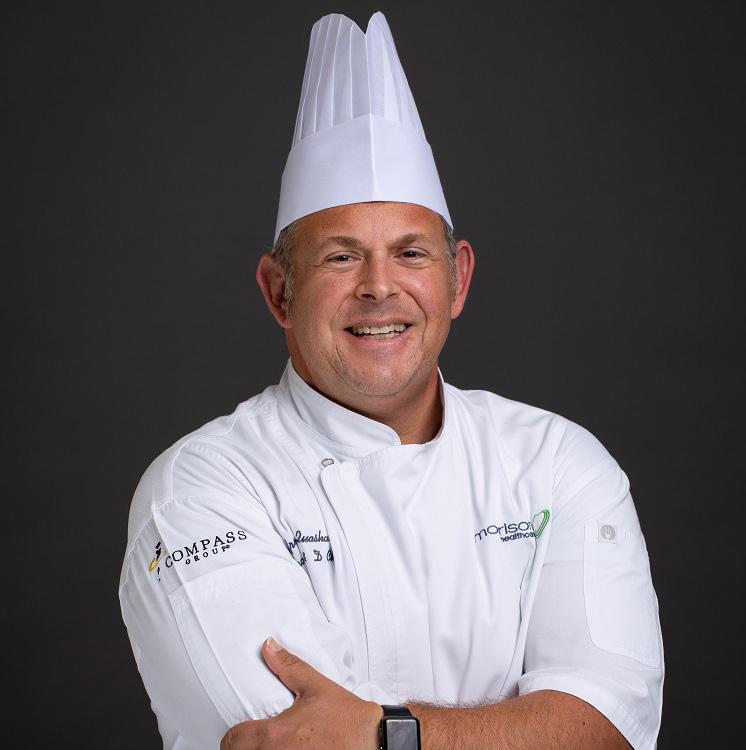
Jeffrey Quasha Senior Director of Culinary Innovation
exceeding our sustainability targets in several areas, which shows that our efforts are making a measurable impact.
Jeffrey: Another key focus is on responsible sourcing. We’re transitioning to humanelyraised pork, which aligns with our commitment to higher animal welfare standards. These intentional purchasing decisions matter because they reflect our responsibility as a leader in healthcare foodservice.
Why is sustainability crucial for healthcare foodservice?
Lisa: Because we’re not just feeding people— we’re nourishing patients, caregivers, and communities. Our approach to sustainability has to be holistic, meaning it supports both human health and environmental well-being.
Jeffrey: Sustainability in healthcare is about healing people and the planet one plate at a time. It’s about making food choices that are better for the environment while still providing the highest level of nutrition and taste.
How is Morrison Healthcare implementing sustainability at the ground level? What are the biggest challenges?
Lisa: It starts in the kitchen. We need to operate in our kitchens like we do at home—being efficient, managing costs, and reducing waste. Every chef, every associate plays a role. That’s why we’re so focused on food waste reduction and sourcing responsibly.
Jeffrey: Of course, there are challenges. Supply chain disruptions, labor shortages, and external factors like avian flu can impact our ability to maintain sustainable practices. But we stay focused by adapting and keeping sustainability at the heart of our decisions.
What are some of the latest innovations or future trends in sustainability?
Lisa: We’re seeing a major push toward electrified kitchens, reducing single-use materials, and expanding plant-based options. These innovations are transforming the way we think about foodservice operations.
Jeffrey: Small moves have big impacts. We’re constantly looking for new ways to innovate, whether that’s through plant-forward menus, sustainable sourcing, or technology that helps us track and reduce waste.
How does Morrison Healthcare contribute to Compass Group’s larger sustainability vision?
Lisa: We play a key role in Compass Group’s global and national sustainability initiatives. Jeffrey and I both serve on the North American Culinary Council Sustainability Team, ensuring that our work aligns with Compass Group’s larger vision.
WE’RE HEALING PEOPLE AND THE PLANET ONE PLATE AT A TIME. THESE SMALL CHANGES HAVE A BIG IMPACT.
QUASHA
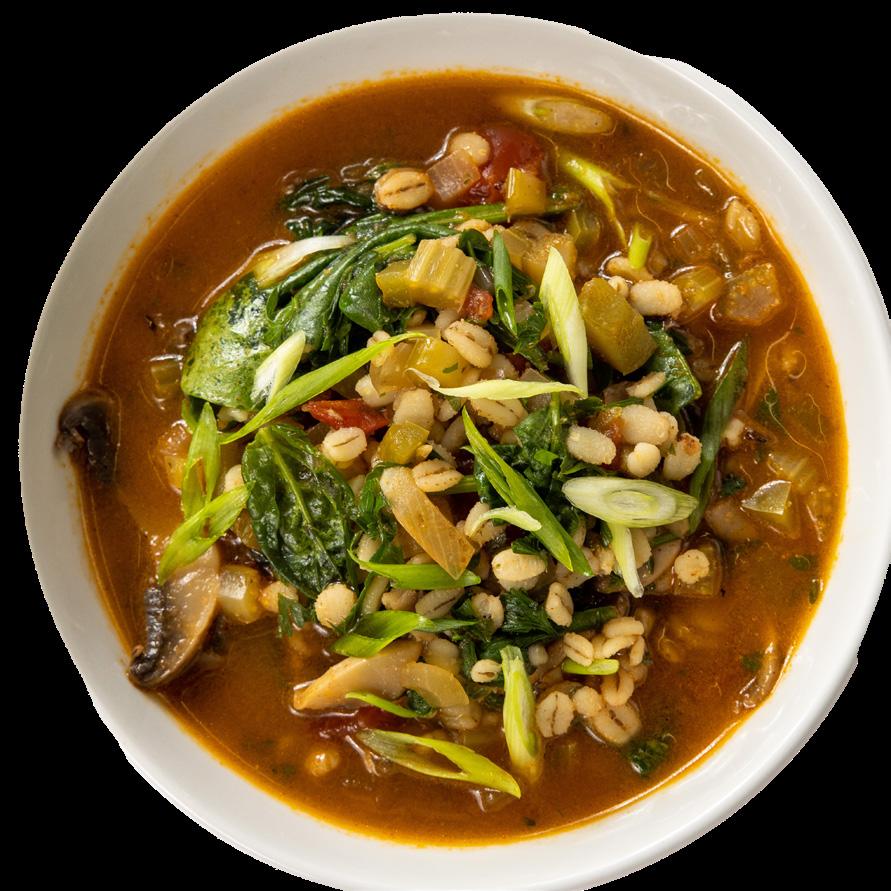
Jeffrey: Our purchasing power as an organization gives us the ability to lead by example. We have the opportunity to make a big impact through responsible sourcing, large-scale food waste reduction, and culinary innovation.
How can our associates and clients contribute to these efforts in their everyday roles?
Lisa: It starts with being intentional. Whether it’s reducing food waste in the kitchen, choosing plant-based options, or supporting sustainable sourcing, everyone is a corporate citizen; we all have to do our part.
Jeffrey: The easiest thing anyone can do? Reduce waste. Whether that’s in our kitchens or our personal lives, being mindful of waste has a direct and measurable impact on sustainability.
As we celebrate Earth Month, Morrison Healthcare is proud to be part of the movement toward a more sustainable future. Through the Power of Food, we’re not just talking about change—we’re making it happen. Let’s keep the momentum going!
Want to learn more?
Dive into this edition of That’s So Morrison to explore Morrison Healthcare’s sustainability initiatives and see how you can make a difference!
33% 25% 8%
$1,866 of all food produced globally is lost or wasted every year of the food wasted globally could feed all 795 million undernourished people in the world of all greenhouse gas emissions each year are due to food loss and waste the annual cost of food wasted by the average American family
Learn more about how you can help stop food waste in your account and at home by scanning here:


APRIL 30, 2025
Started in 2017 by Compass Group USA, Stop Food Waste Day is now recognised globally in every corner of the world as we unite to educate, inspire, and ignite change.
Our mission is to ignite change regarding the global food waste problem. We start by drawing attention to the issues at large. We simultaneously engage with society at all levels to educate and share practical,
creative, and impactful ways we can all change our behaviour to reduce food waste.
We recognize that food waste is not only a moral issue, but a key contributor to climate change too. Wasting food is a waste of the energy to grow, harvest, process, and cook, and food waste in landfills can cause methane emissions, a potent greenhouse gas.

In the bustling kitchens of Morrison Healthcare’s hospitals, there’s more than just great food being made—there’s a movement happening. A movement toward sustainability, efficiency, and responsibility. And leading the charge in northeast Ohio and southern Florida is Chef Gustavo Perez, a regional executive chef with a passion for reducing food waste and making a real impact.
“For a chef, seeing the amount of food waste we generate can be really discouraging,” Chef Gustavo shares. “As part of the largest foodservice corporation in the world, we have a responsibility to do better, not just for our costs, but for our planet.”
And he’s right. Food waste isn’t just about tossing leftovers; it’s about rethinking how kitchens operate, how menus are planned, and how resources are managed. For Morrison Healthcare, reducing waste isn’t just a good practice, it’s a priority.
So, what does food waste reduction look like in a high-volume healthcare setting? It starts with data.
“We use Waste Not 2.0, a tool developed by chefs, for chefs, to track and measure food waste efficiently,” Chef Gustavo explains. “The focus is on source reduction, figuring out where waste happens and stopping it before it starts. By tracking trends, we can cut down on unnecessary costs and, at the same time, improve the quality of the food we serve.”
This means better forecasting, smarter purchasing, and more mindful cooking—all key to making hospital kitchens more sustainable.
Rolling out a food waste reduction program in a busy hospital kitchen isn’t as simple as sending an email. It takes real-world action.
“I wanted to go back to the basics with my chefs,” says Chef Gustavo. “At the end of each meal period, we open the hot box and see what’s left. Then we ask, ‘What happened? Did we overproduce? Did we have unexpected patient volume changes?’ These small moments of reflection help us make better decisions moving forward.”
By meeting chefs where they are— amidst the rush of meal prep, service, and clean-up—Gustavo has been able to help them integrate waste reduction into their daily workflows.
“We’re working alongside hospital leadership to align with their sustainability goals, making sure we’re not just reducing costs but truly diverting waste away from landfills,” he explains. “My job is to provide support, training, and resources to make waste reduction second nature for our chefs.”
That starts with education; helping chefs see waste as more than just a byproduct of foodservice, but as something they can actively manage and improve upon.
The impact of these efforts goes beyond reducing waste—it’s creating a new culture of sustainability.
“We now have Waste Not Champions, chefs who collaborate with unit chefs to lead the program,” Chef Gustavo shares. “They’re looking at how we can go even further, pushing innovation and creativity in reducing waste at each hospital.”
And that’s the real goal: making sustainability not just a policy, but a passion.
Through thoughtful leadership, smart tools, and a commitment to education, Chef Gustavo Perez and his team are proving that reducing food waste isn’t just possible—it’s the future of foodservice.
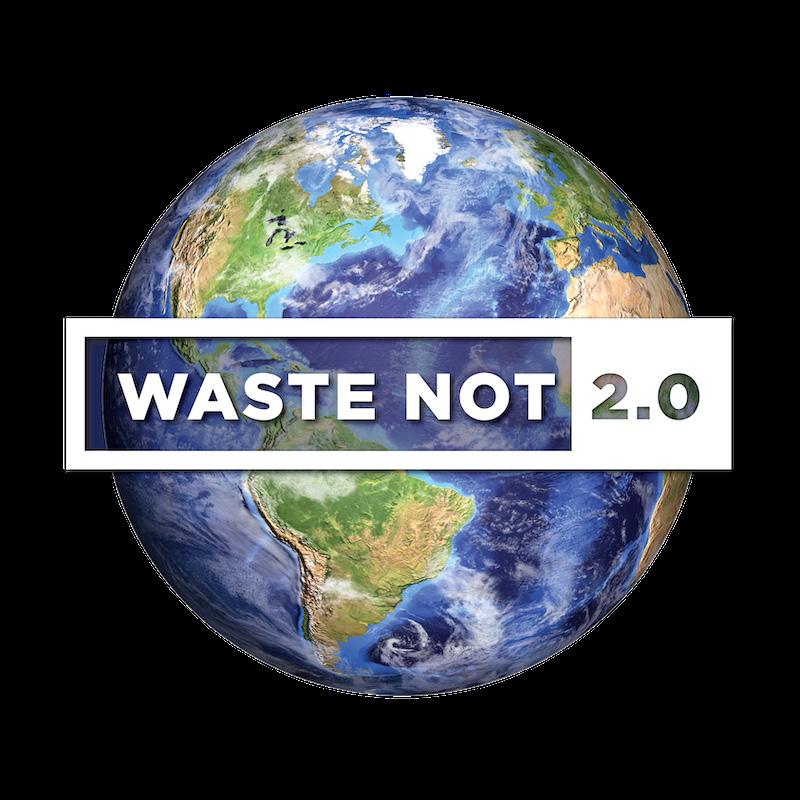
IF IT’S JUST AN EMAIL, IT WON’T STICK. IT NEEDS TO BE WOVEN INTO KITCHEN LIFE THROUGH CONVERSATIONS, REMINDERS, AND REAL-TIME SUPPORT.

“It can’t just be an initiative—it has to be part of your daily and weekly to-do list,” Chef Gustavo says. “If it’s just an email, it won’t stick. It needs to be woven into kitchen life through conversations, reminders, and real-time support.”
To keep waste reduction top of mind, Chef Gustavo uses creative approaches like:
• Calendar reminders for special sustainability days
• Surveys to gather insights from chefs
• WhatsApp group chats to quickly recognize wins and share ideas
“Our chefs aren’t sitting at desks; they’re in the kitchen making food,” he says. “So I needed a way to reach them in real time. That’s where WhatsApp came in. I can send a quick message—‘Hey, shoutout to Chef Miguel for repurposing extra roasted vegetables into soup!’—and within minutes, the team sees it. They get inspired. They want to take part.”

Pumpkin isn’t just for pie—it’s a sustainability powerhouse. Our friends at Libby’s have been growing America’s favorite canned pumpkin for generations. But what’s even more impressive is that they use every single part of the pumpkin—nothing goes to waste.
Libby’s pumpkins are grown in Morton, Illinois (aka the Pumpkin Capital of the World), and their process is all about freshness and efficiency. The pumpkins are harvested, cleaned, and canned within 24 hours, locking in peak flavor and nutrition. That means when you pop open a can of Libby’s, you’re getting 100% pure pumpkin—nothing else. But they don’t stop there.
Every Part of the Pumpkin Finds a Purpose
Stems, skins, and vines? Leftovers from the harvesting process are turned into organic fertilizer to nourish future crops.
Extra pumpkin purée? Leftover pulp is used to enrich nearby farmland instead of being discarded.
Seeds? Pumpkin seeds are sent to local vendors for roasting (because who doesn’t love pumpkin seeds?).
Beyond sustainability, Libby’s pumpkin is a nutritional powerhouse—high in Vitamin A, fiber, and naturally gluten-free. And it’s not just for pies! Try it in soups, sauces, smoothies, or even as a butter alternative in baking.
By partnering with Libby’s, we’re bringing this sustainably sourced, nutrient-rich ingredient to our menus in a way that’s good for people and the planet.

Libby’s uses:
Crop rotation and vertical tillage to keep soil healthy
Landfill-free processing to minimize waste
Recycling programs for un-used cans and materials
Sustainability starts in the kitchen! We’ve integrated ingredient-level emissions data directly into MenuWorks, our proprietary nutrition database. Now, chefs can see carbon emissions data as they build recipes and plan menus—filtering by high, medium, or low emissions.
Plus, this data supports guest engagement through our new Climate-Friendly menu icon, helping cafés guide guests toward lower-emission meal options.

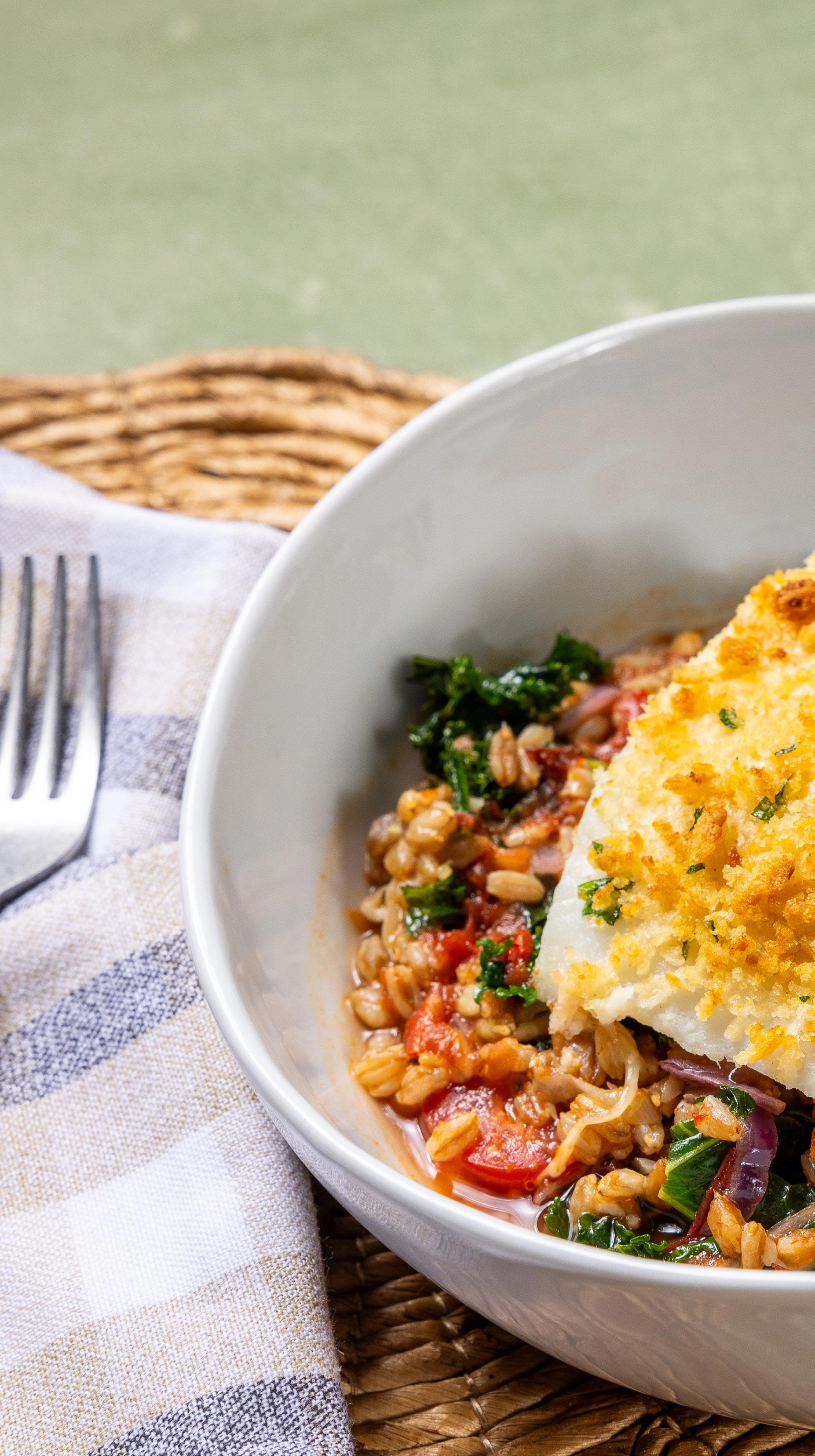
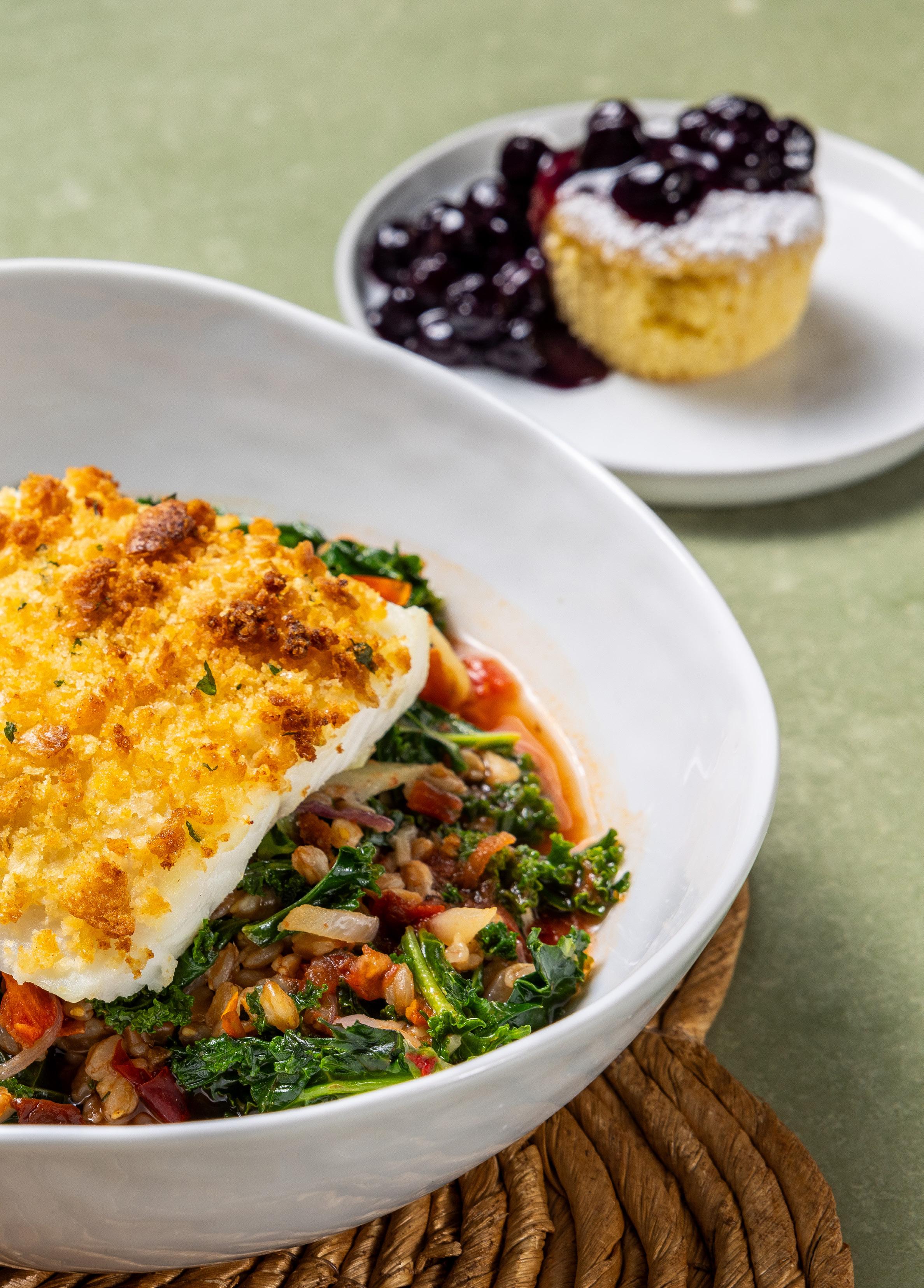
Lemon Herb Haddock Recipe #166053.2 of Morrison Healthcare recipes qualify as low greenhouse gas emission meals
53%
Interested in having the Climate Friendly MenuWorks tag for Complete this form.

Let’s start with the big question: Why are plants at the center of our menus?
Chef Jay Z: It’s all about staying ahead of the trends and meeting the needs of our guests. Right now, plant-forward dining is a major focus in the food world, and we want to be at the forefront of that innovation.
Beyond trends, there’s the nutritional aspect. If you look at MyPlate guidelines, half of the plate should be fruits and vegetables, with the other half made up of grains and proteins. By putting plants in the spotlight, we’re ensuring our guests get the healthiest, most nutrient-dense options.
At the end of the day, it’s about education. We have to train our teams and the people we serve to understand why we’re
At Morrison Healthcare, plants are taking center stage in our hospital cafés. With a focus on plant-forward menu innovation, we’re redefining the way guests experience food—where protein is the garnish, not the star. To dive deeper, we sat down with Chef Jay Z, Corporate Executive R&D Chef, to talk about the future of plant-forward dining and how our pop-up brands are leading the way.
making these changes and how they can benefit from them. One approach I take is always creating a dish as vegetarian first, then adding protein as an option. Grains, lentils, and beans are fantastic protein sources, and when we use the right spices and techniques, they’re just as hearty and satisfying as traditional meat proteins.
How do we bring this plantforward vision to life in our hospital cafés?
Chef Jay Z: It starts with training. We need to equip our chefs and retail teams with the right knowledge and tools to make plant-forward dining exciting and accessible. We’re introducing recipes that focus on vegetables as the main attraction.
Sampling is another huge component. If we want guests
to embrace these dishes, we need to give them a chance to try them first. That means having a strong talk track and marketing plant-forward options in a way that makes them exciting.
What’s the biggest challenge in making plant-forward dining the norm?
Chef Jay Z: Winning people over. There’s still a perception that plantforward means sacrificing flavor or satisfaction, and that’s simply not true. Our job is to change that mindset by showing guests that plant-based meals can be just as delicious and filling as traditional options. Education is key—if our chefs and retail teams understand the benefits and how to talk about them, that message will naturally carry over to our guests.
What’s next for plant-forward innovation in our cafés?
Chef Jay Z: We’re diving deeper into global flavors. Ethnic cuisines like Indian and Mediterranean have a rich history of plant-based dishes, and we want to explore those flavors in our menus. We’re also looking at creative ways to prepare and present vegetables— think vibrant stir-fries, hearty grain bowls, and exciting new techniques to bring out the best in every ingredient.
AT THE END OF THE DAY, IT’S ABOUT EDUCATION— EDUCATING OUR TEAMS AND GUESTS. —CHEF JAY Z “

HAVE YOU TRIED THIS POWER BRAND?
• Heirloom Tomato Ricotta Salad
• Fried Green Tomato & Pimento Cheese Salad
• Beefsteak Tomato Sandwich
• Southern Heirloom Tomato Pie


A great burger starts with a great bun, and now, we’ve got one that’s just as delicious as it is inclusive. Thanks to our partnership with Aspire Bakeries, we’ve made the switch to a plant-based brioche bun—now the new standard for our grills.
Egg-Free, Flavor-Full Brioche is known for its rich, buttery flavor and soft texture, but traditionally, that comes from eggs and dairy. Aspire has cracked the code (without cracking an egg) and created a plantbased version that delivers the same indulgent experience. Whether guests follow a vegan diet or just love a great burger, this bun is a win for everyone.
The best part? You don’t have to be vegan to love it. This brioche bun delivers on everything we love about the classic— without the eggs.
So, next time you fire up the grill, you’re not just serving a better burger—you’re serving a better choice.

Buffalo Cauli Club Sandwich Recipe #125734
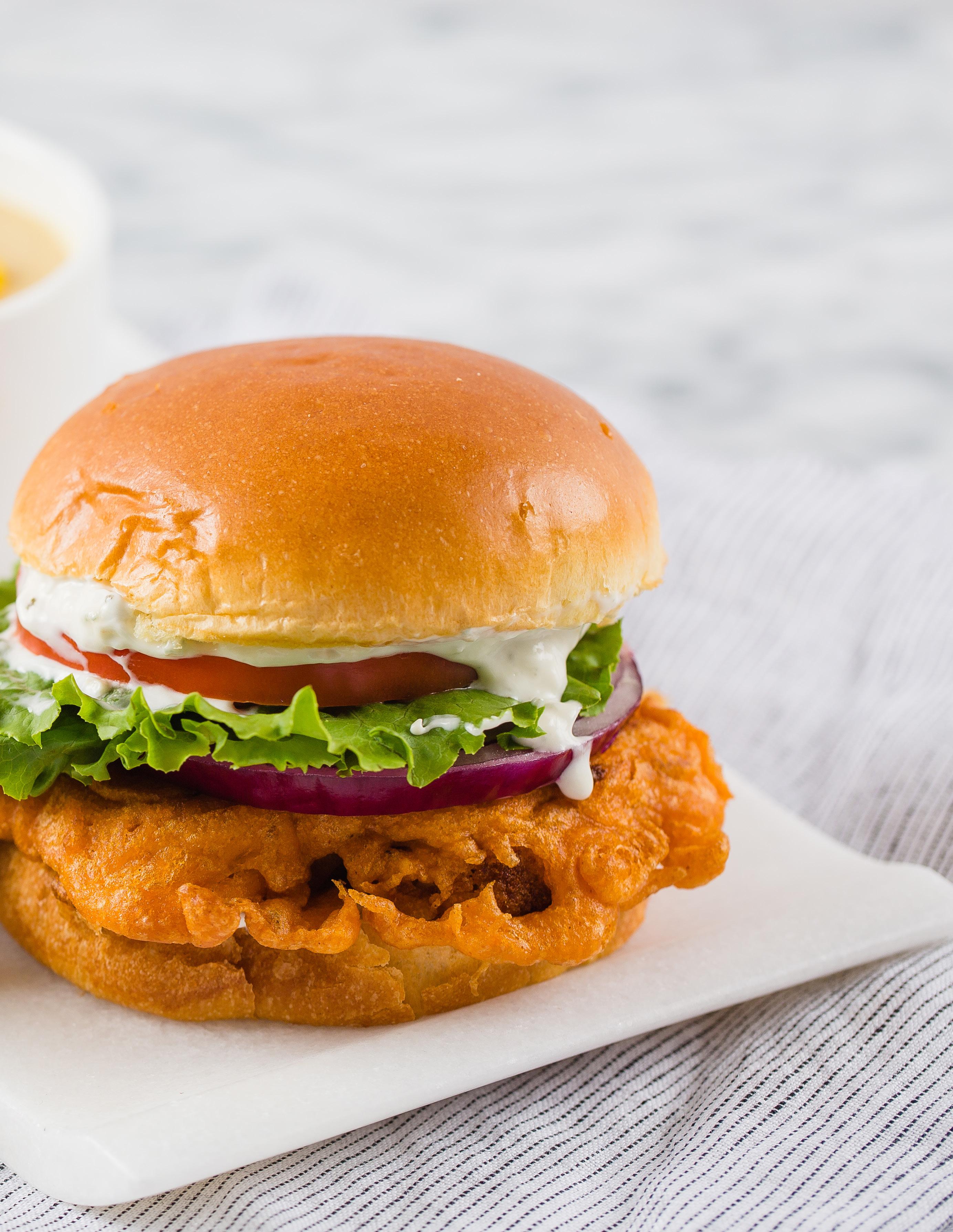
This change isn’t just about taste—it’s about impact. By moving to Aspire’s eggless brioche, we’re significantly reducing egg consumption across our operations. That means:
• Fewer eggs used equals lower environmental impact; for every case of Brioche, you will save eight shelled eggs
• More inclusive options for guests
• A delicious, premium bun that everyone can enjoy
• Same great taste and texture: soft, slightly sweet, and holds up to any burger build
• Vegan-friendly and dairy-free: an easy way to cater to all guests
• Convenient and easy to use: thawand-serve simplicity for busy kitchens
• Sustainability in every bite: a small switch that makes a big difference
At UCI Medical, they’re not just cooking, they’re setting the stage for the future of food. Sustainability is more than a buzzword here; it’s woven into their culinary DNA. By integrating bold, plant-forward initiatives into their menus, pop-ups, and retail spaces, they’re proving that great-tasting food can also be good for the planet. Join us as we sit down with Regional Executive Chef Joseph Hirsch to learn how he is pushing the boundaries of sustainability.
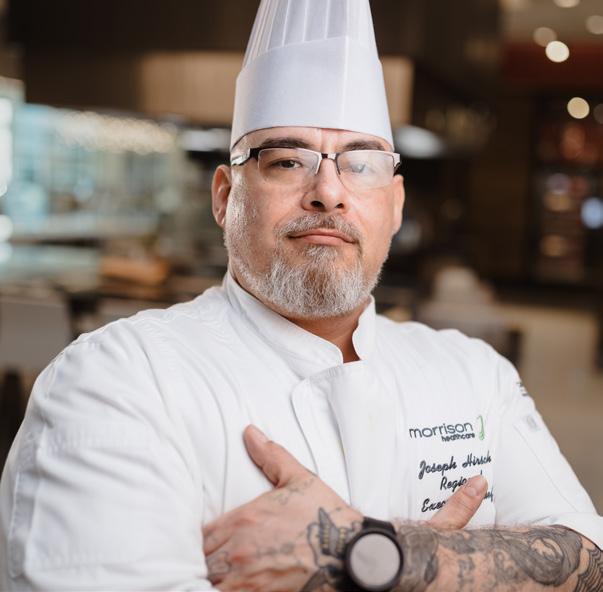
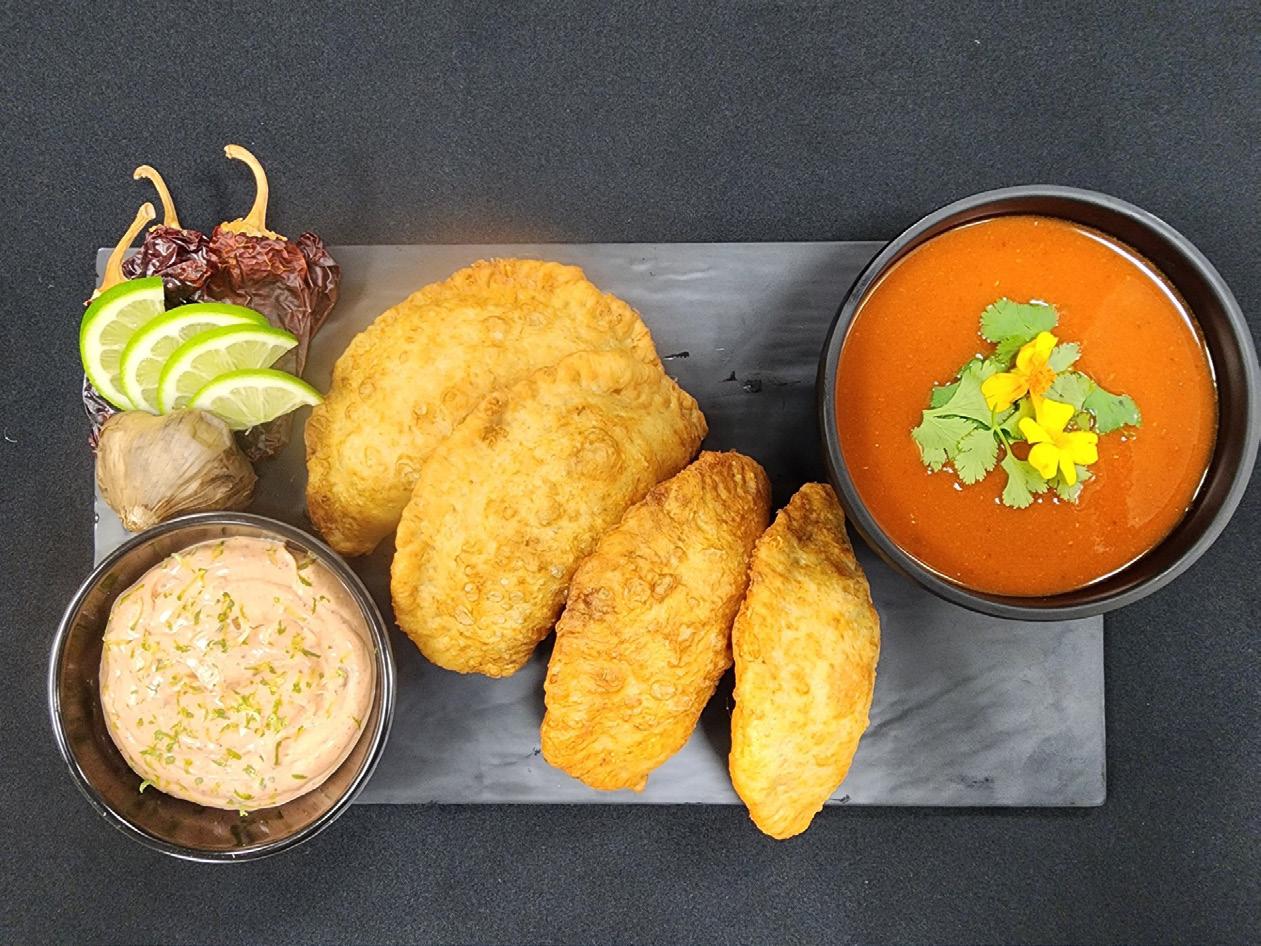

Gone are the days when plant-based dishes were an afterthought. We’re leveling up menu rotations with innovative proteins like jackfruit, mushrooms, and tofu—bringing excitement to the plate while championing sustainable practices. Our retail brands and pop-ups serve as playgrounds for creative exploration, allowing us to introduce new trends that engage both our guests and culinary teams.
One of my favorite projects to date was participating in the 2024 Healthcare Without Harm Plant-Forward Contest. We showcased a jackfruit pho bowl—an absolute game-changer for our plant-forward popup event. To elevate the experience, we crafted marketing materials packed with fun facts and education, sparking curiosity and engagement with our guests. We even developed a digital cookbook for the dish, ensuring our plant-forward innovation could be replicated and enjoyed beyond the event.
And let’s talk about bringing the heat! We went all in for the Impossible Beef Contest, crafting a threechili consommé with a poblano Impossible beef empanada, our take on a birria-style experience.

The response? Pure excitement. Our team is always looking for fresh ways to push plantforward concepts, proving that sustainability and indulgence can go hand in hand.
UCI Medical isn’t just along for the ride—they’re leading the charge. As the first campus to eliminate bottled plastic beverages, they’ve embraced aluminum alternatives, compostable packaging, and eco-friendly smallwares. Their commitment to sustainability earned them the 2023 Sustainable Initiative of the Year award, solidifying their role as a community leader.
Beyond food, we’re leveraging programs like Waste Not 2.0, Chefs to End Hunger , and compost initiatives to make an even greater impact. And with the support of Bill Lawhead, Resident Regional Director, and Heather Farkas, Director of Sustainability, we’re actively advancing Practice Greenhealth initiatives and integrating low-emission proteins into our daily operations. Collaboration is the name of the game, and together, we’re building a culture of sustainability that thrives.

GONE ARE THE DAYS WHEN PLANT-BASED DISHES WERE AN AFTERTHOUGHT. WE’RE LEVELING UP WITH BOLD, FLAVORFUL INNOVATION.
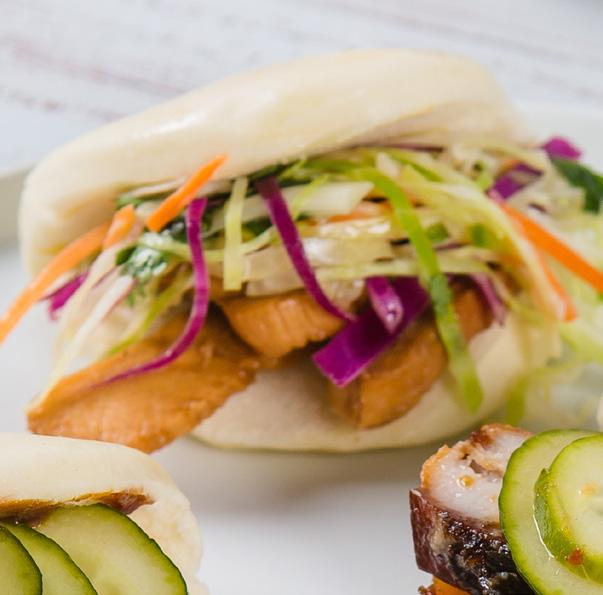
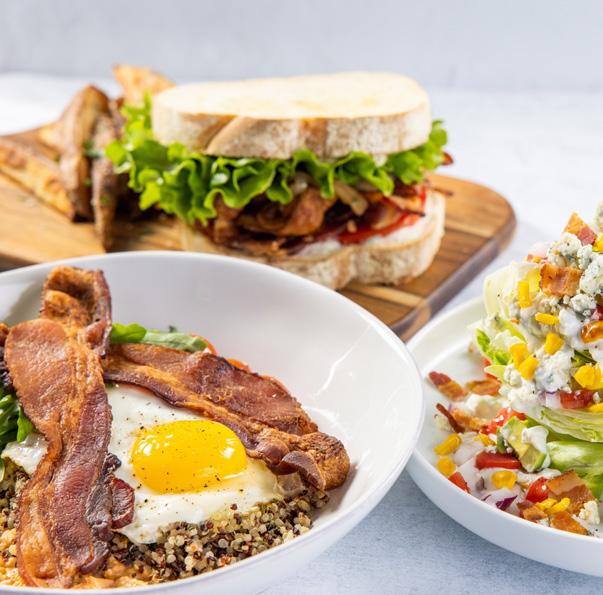

One of Chef Joseph Hirsch’s favorite pop-up brands. He likes that there are plant-forward options to draw in a variety of guests.
With the plant-forward option to substitute traditional bacon for eggplant “bacon,” The Bacon Club has been a big hit for our vegetarian guests.
Birria tacos are one of Chef Hirsch’s favorite LTOs. He likes adding them to his ramen station or featuring them at the Embers grill station.
Pop-Ups, LTOs, and Flavorful Innovation
When it comes to pop-ups, I’ve got two favorites: Take a Bao and Bacon Club. Both brands put a creative spin on traditional dishes while offering fun, plant-forward options.
And let’s not forget about LTOs! Birria tacos are my go-to, they bring bold, rich flavors that can transform any retail space. Our smoky chipotle and guajillo chili birria broth recipe with jackfruit is an excellent plantforward option, mimicking the flavors and presentation of traditional birria. You can even take it up a notch by featuring them at a ramen station or as an Embers
daily special. The possibilities are endless!
Why Sustainability Matters
Sustainability isn’t just about reducing waste, it’s about giving back. It’s a fundamental part of menu development and procurement, ensuring that we’re sourcing fresher, seasonal, and locally grown ingredients. This approach doesn’t just enhance flavor—it reduces emissions and supports our local food systems.
At the end of the day, food has the power to inspire change. And for us at UCI Medical, sustainability isn’t just a trend—it’s a movement.
pop-up brand is your favorite?

Morrison Healthcare’s Power Brands are a collection of six innovative pop-up concepts—All Caps, Beet Root, Carrot Greens, Cauli Club, On the Vine, and Silver Kings—each centered around a single plant-based ingredient. Designed with both health and sustainability in mind, these concepts embrace root-to-stem cooking, ensuring that every part of the vegetable— stalks, leaves, stems, and skins—is utilized to minimize food waste. With a simplified yet flavorful menu, each Power Brand highlights the unique textures and tastes of its star ingredient, proving that sustainability and great food go hand in hand.




WE STRIVE TO USE ALL PARTS OF THE FRUIT AND REPURPOSE THOSE WE CAN’T MAKE INTO OUR DELICIOUS BITES INTO ORGANIC FERTILIZERS. “
Morrison Healthcare is always looking for ways to add more flavor, texture, and purpose to the food we serve. That’s why we’re bringing DOLE ® GOOD CRUNCH—a crispy, fruit-forward topping that’s as good for the planet as it is for your taste buds—to our cafés.
What’s the Hype?
Think of DOLE® GOOD CRUNCH as a light, airy, and naturally-sweet way to add a little something extra to your salad, grain bowl, or yogurt. Made from gently dehydrated fruit, it locks in nutrients without added sugar, artificial ingredients, or fillers.
More Than Just a Tasty Topping
This isn’t your average crunchy snack— it’s part of a bigger movement toward better food choices and sustainability.
Bringing the Crunch to Your Plate
We’re taking DOLE® GOOD CRUNCH beyond the snack aisle and into our cafés. Whether you sprinkle it on a salad, mix it into a grain bowl, or enjoy it on its own, you’re getting real fruit with real benefits—zero artificial ingredients required.
Small Change, Big Impact
By adding DOLE ® GOOD CRUNCH to our lineup, we’re reinforcing our commitment to sustainable sourcing and giving our guests a better way to snack. Every bite is a step toward reducing waste, supporting farmers, and making smarter food choices.
Next time you hit the salad bar, try it out—you might just find your new favorite crunch!

• Naturally sweet and crunchy with no added sugar
• Non-GMO, gluten-free, and vegan—a clean, simple snack
• A good source of fiber and potassium
• Sourced from local farmers to support sustainable agriculture
• Made with solar energy to reduce CO2 emissions
• Repurposes imperfect fruit to cut food waste
• Leftover peels? They’re turned into organic fertilizer
Great food starts with great sourcing. That’s why Morrison Healthcare is making the switch to premium Faroe Island Salmon in partnership with High Liner Foods. This isn’t just an upgrade in quality—it’s a commitment to sustainability, taste, and responsible sourcing that benefits both our guests and the planet.
What Makes Faroe Island Salmon Stand Out?
Tucked between Scotland and Iceland, the Faroe Islands are home to some of the world’s best salmon, thanks to strong ocean currents and pristine waters. These natural conditions create an environment where salmon thrive, resulting in fish that are not only high-quality, but also raised responsibly.
Quality You Can Taste
From fjord to freezer in just 72 hours, every fillet is handled with care to maintain peak freshness and consistency. Whether pan-seared, grilled, or poached, Faroe Island Salmon delivers a premium dining experience in every bite.
By making the switch, Morrison Healthcare is reinforcing its commitment to sustainable sourcing—because great food should do good, too.
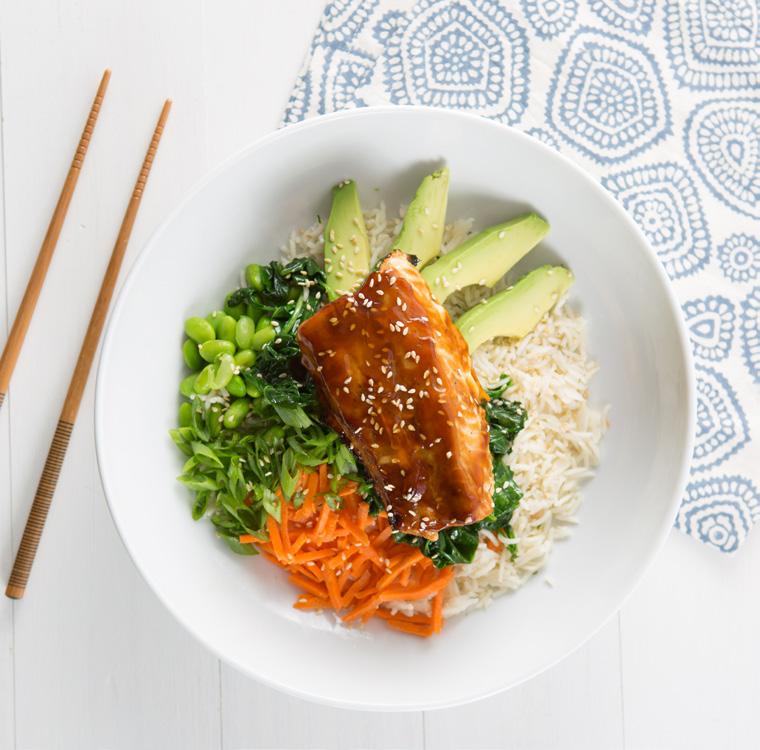

122,260 pounds of Faroe Island Salmon will be purchased in FY25, a 93% increase from the prior year.
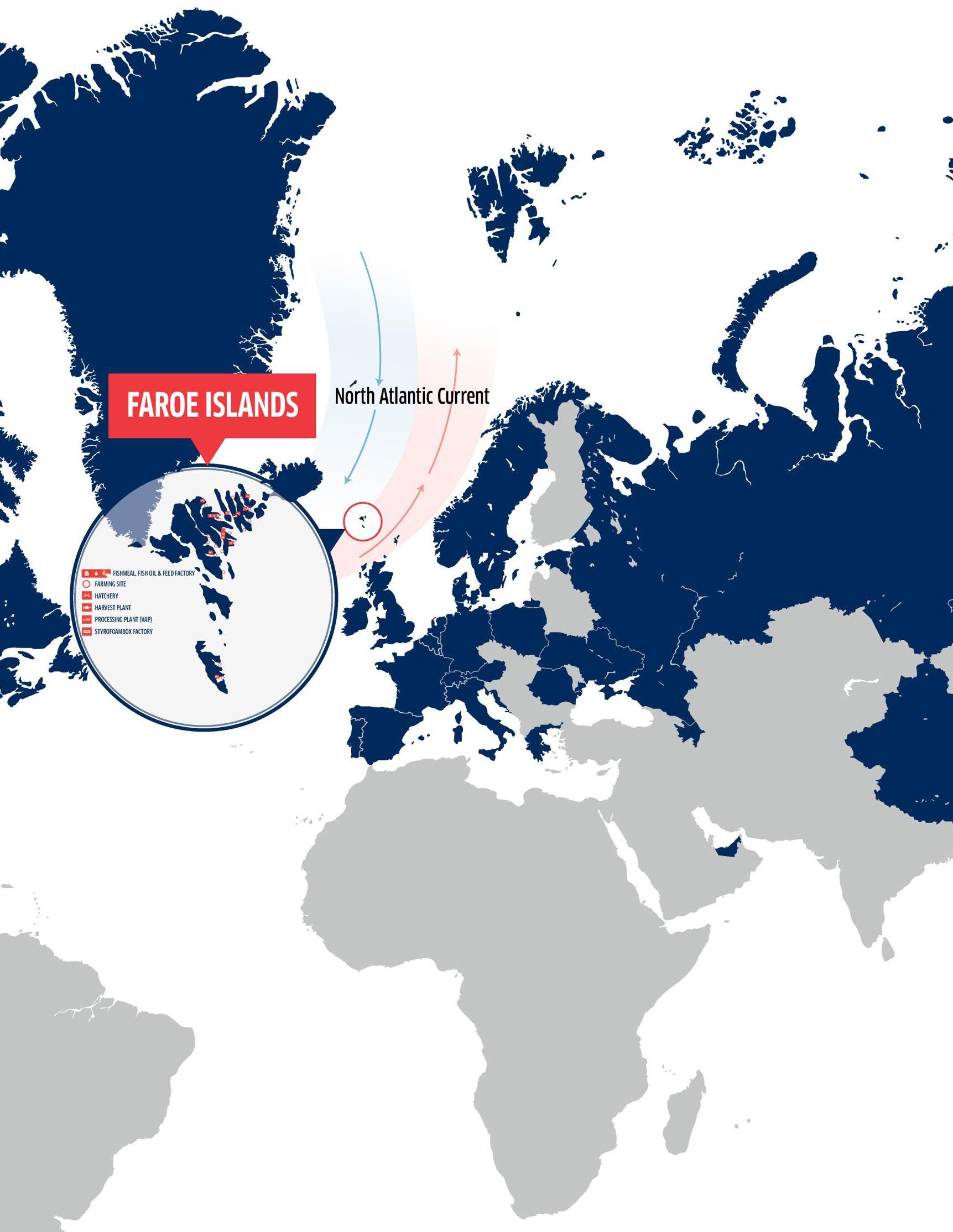
Why It’s a Smart Choice for Our Menus Faroe Island Salmon Isn’t Just Better—It’s the Best Option for Both Health and Sustainability.
Better for You:
• ASC-Certified, Meeting the Highest Standards for Responsible Aquaculture
• Packed with Omega-3s for Heart and Brain Health
• Buttery Texture and Rich Flavor That Make Every Dish Shine
Better for the Planet:
• Raised In Strong Currents That Naturally Promote Fish Health
• Antibiotic-Free Diet, Ensuring Clean, Natural Fish Production
• Quick Processing and Freezing To Lock In Freshness And Reduce Food Waste
As plant-based dining continues to rise in popularity, Morrison Healthcare is taking a bold step forward with its new plant-based patient menu— designed to be nutritious, flavorful, and environmentally responsible.
Strategic Marketing Manager Bayleigh Miller sits down with Jeffrey Quasha, Senior Director of Culinary Innovation, and Jillian Marino, Corporate Culinary Dietitian, to talk about how the menu was developed, why it matters, and what’s next.
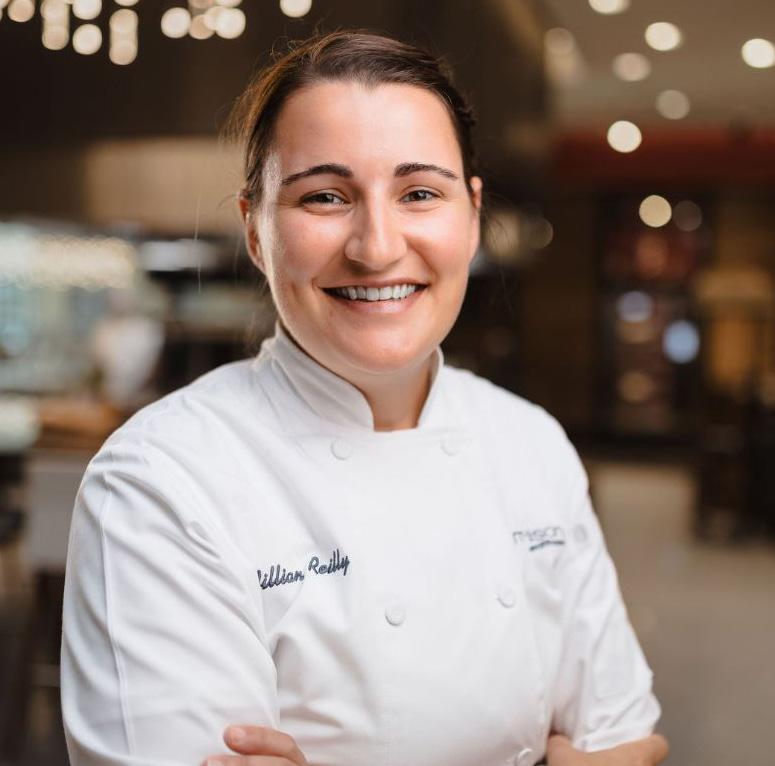
Ono-licious

60% OF MORRISON HEALTHCARE RECIPES IN MENUWORKS ARE PLANT-FORWARD. THAT’S OVER 5,500 RECIPES!
What inspired the creation of Morrison Healthcare’s plant-based patient menu?
Jeffrey: Our goal was to create a menu that not only supports health and wellness, but also reduces our carbon footprint. We know that plant-based eating is on the rise, not just in restaurants but in hospitals too. Patients are requesting more plant-forward meals, and we saw an opportunity to develop something truly innovative.
How does the plant-based menu compare to other patient menus?
Jeffrey: We submitted three menus for carbon analysis—our core patient menu, existing patient menu, and the new plant-based menu—to see the impact of our food choices. Think of it as a “good, better, best” approach. The existing menu is good, the core menu is better, but the plant-based menu is the best when it comes to lowering our carbon footprint.
Can you explain the carbon analysis process?
Jeffrey: We’ve partnered with How Good, a company that specializes in sustainability data. They analyze our menus and help us measure our impact. The insights we get from them guide us in making more sustainable menu decisions.
What are Morrison Healthcare’s carbon reduction goals?
Jillian: We’re aiming for a 50% reduction in carbon emissions by 2030. By the end of 2025, we need to show at least a 20% reduction to stay on track. It’s a big goal, but every menu choice we make helps move us closer to that target.
How was the plant-based menu designed?
Jillian: We built the menu around grains and vegetables and reduced the portion size of animal proteins so they become more of a garnish rather than the main attraction. This mirrors the fast-casual and QSR (Quick Service Restaurant) trends we see at places
What’s an example of a standout dish on the plant-based menu?
Jeffrey: Our Buffalo Cauliflower Sandwich has been a big hit. It’s crispy, spicy, and delicious—proving that plantbased food can be just as craveable as anything else on the menu.
How do accounts request the plantbased menu?
Jillian: We don’t believe in a one-sizefits-all approach. When an account is interested, we work with them to understand their specific needs, whether it’s bedside service, room service, or a hybrid model. We then customize the menu accordingly.
Are there any success stories from accounts that have implemented
WE DON’T BELIEVE IN A ONE-SIZE-FITS-ALL APPROACH.
—JILLIAN MARINO

1 SUSTAINABLE FOOD PRACTICES CAN IMPROVE PATIENT AND STAFF HEALTH.
2 BY MINIMIZING FOOD WASTE AND PURCHASING SUSTAINABLY, HOSPITALS CAN CONTROL COSTS THROUGH THEIR FOOD PURCHASING AND MANAGE THEIR OPERATIONS MORE EFFICIENTLY.
3 CREATING A SUSTAINABLE FOODSERVICE OPERATION CONTRIBUTES TO ENVIRONMENTAL SUSTAINABILITY.

SUSTAINABILITY INITIATIVES CREATE VALUE FOR HOSPITALS. MANY PATIENTS AND COMMUNITY MEMBERS VALUE ENVIRONMENTAL AND SOCIAL RESPONSIBILITY.
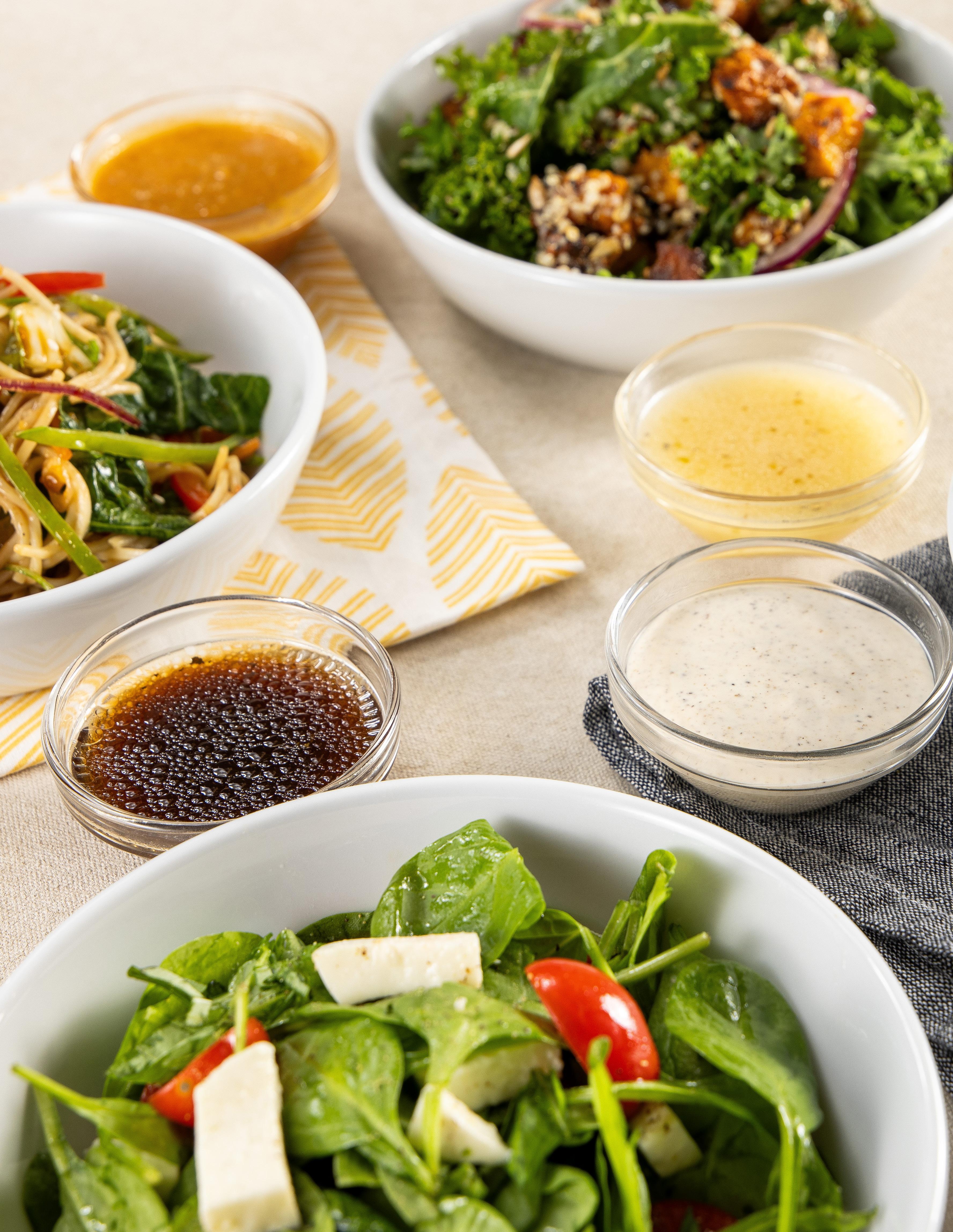
SUSTAINABILITY EFFORTS CAN LEAD TO REGULATORY COMPLIANCE AND RISK REDUCTION.

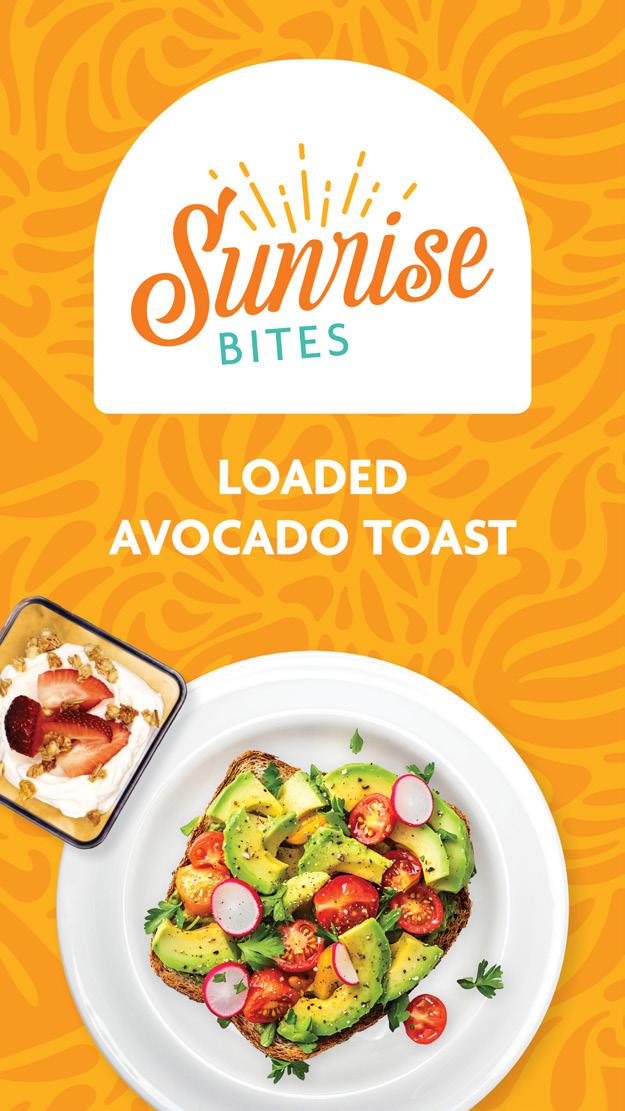

How do you market plant-based menus to clients and patients to make them more appealing?
Jillian: It’s all about storytelling and making plant-based food desirable rather than positioning it as a compromise. If we say, “Here’s a flavorful lentil bolognese or a rich, spiced vegetable curry,” it immediately sounds more exciting.
Beyond patient menus, what other plant-based initiatives are happening?
Jeffrey: We’re collaborating with Campbell’s to develop veg-centric soups that align with patient standards.
We’ve already created seven limited-time offerings, including Black Bean Soup and White Bean Chili, which can be modified to include protein if needed.
Final thoughts: what excites you most about the future of plant-based dining in healthcare?
Jillian: We’re shifting the perception of hospital food. With every new plant-based dish we create, we’re showing that healthy, sustainable, and delicious food can exist in a healthcare setting. This is the future, and we’re proud to be leading the way!

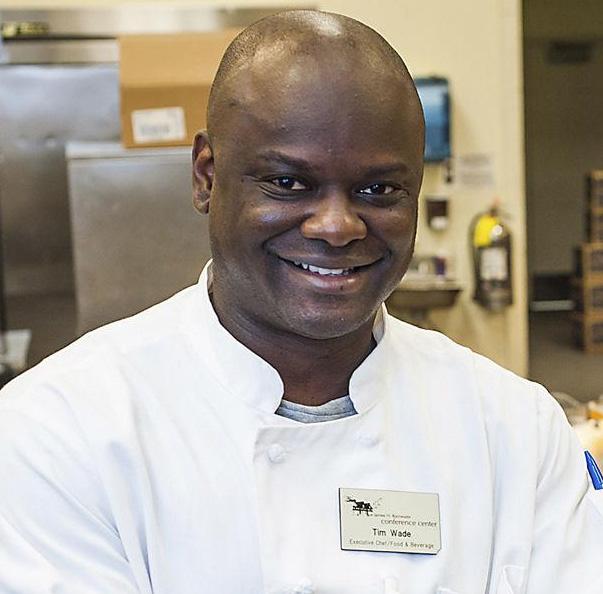
Chef Wade’s passion for food has evolved into a mission: creating a healthier, more sustainable future through plant-forward cuisine. His commitment to responsible dining was recently recognized during Chef Appreciation Week 2024, where he received Morrison Healthcare’s Social Responsibility Award
“Plant-forward menuing is one way we can drive real change,” says Chef Wade. “We’re constantly finding innovative ways to use plants in everything from entrées to patient meals. It’s the future, it’s better for the planet, and it’s better for our patients.”
But his impact doesn’t stop at patient dining. As Morrison Healthcare continues to elevate sustainable and nutritious options, Chef Wade is helping shape the growing retail food space, ensuring that hospital cafés offer
For Chef Tim Wade, food has always been more than just fuel—it’s a way to nourish, heal, and bring communities together. His culinary journey started in his teens, flipping pans in restaurant kitchens before heading to culinary school. Fast forward 25 years, and he’s now the executive chef at Northside Hospital in Atlanta, where he’s leading the charge in sustainable dining.
more than just the usual graband-go sandwiches and burgers.
“When guests walk into our cafés, we’re giving them choices— delicious, fresh options made with vibrant vegetables and plantbased proteins,” he explains. “By making plant-forward food more exciting and accessible, we’re influencing the health of not just our patients, but our entire community.”
What started as a small initiative at one hospital has now rippled across entire health systems and regions. Chef Wade sees endless opportunities to expand sustainable dining across Morrison Healthcare’s footprint, proving that small changes can lead to a big impact.
“One of the best parts of my day is visiting with patients to talk about their meals and how
nutrition plays a role in their healing,” he shares. “I want them to see that healthy eating isn’t just important for recovery—it’s key to lifelong wellness. That’s why we’re integrating plant-forward options into every aspect of our menus, from patient trays to retail offerings. The more we incorporate plants, the more we empower people to make better choices for their health and the planet.”
Through his leadership, innovation, and unwavering commitment to sustainability, Chef Wade is proving that food isn’t just about what’s on the plate—it’s about the impact it makes far beyond the kitchen.
IT’S THE FUTURE—IT’S BETTER FOR THE PLANET, AND IT’S BETTER FOR OUR PATIENTS. —CHEF TIM WADE “

GET READY FOR PURE MAGIC
Menu Highlights:
• Glazed Oyster Mushroom Rice Bowl
• King Mushroom “Scallop” Salad
• Crispy Oyster Mushroom Salad
• Cheesy Garlic & Artichoke Stuffed Mushrooms
Silver Kings Power Brand
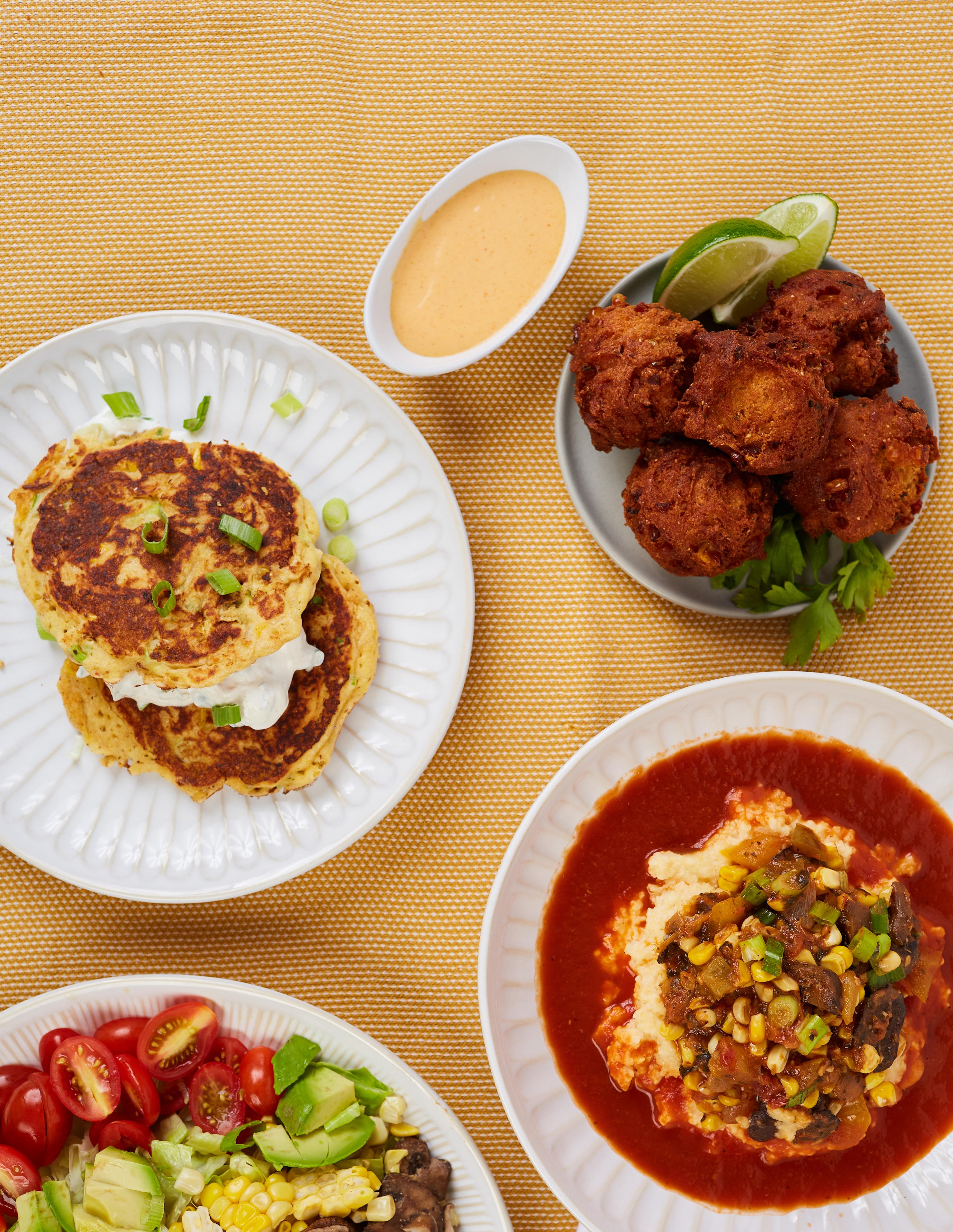
Sustainability Spotlight:
At Morrison Healthcare, we know that sustainability isn’t just a trend—it’s a way of life. And if anyone embodies that, it’s Chef Paul Cernansky, Executive Chef at Prisma Health Baptist Hospital in Columbia, South Carolina. With a career that’s taken him across the globe and back, Chef Paul has mastered more than just great food—he’s made it his mission to cut down on waste and make the most of every ingredient.
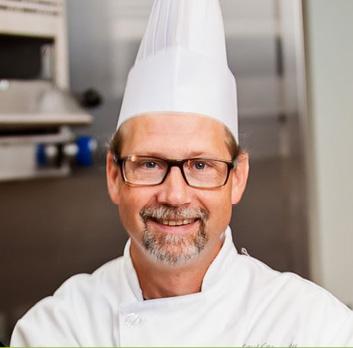
Paul’s culinary journey started early; at just 15 years old, he was working as an assistant cook at a children’s camp, and that first gig sparked a lifelong passion. Over the years, he’s cooked everywhere from high-end restaurants to banquet halls, even spending two and a half years in Baghdad as a civilian contractor chef. Before stepping into healthcare, he was the Executive Chef at Ruth’s Chris Steakhouse for nearly seven years.
But it wasn’t until a fellow chef introduced him to Morrison Healthcare that he found his perfect fit. “I feel like the opportunities to do what I love are endless here,” Chef Paul says. And one of the things he loves most? Finding creative ways to minimize food waste.
At home, Chef Paul is all about sustainable living. He composts, grows his own fruits and veggies, and even tends to an herb garden. He jokingly calls himself a “closet hippie,” but his dedication to sustainability is no joke. It’s a philosophy he’s brought into the kitchen, and it’s paying off in a big way.
Waste Not 2.0: A Game-Changer in the Kitchen
What’s one of the biggest tools in Chef Paul’s sustainability playbook? Waste Not 2.0, a digital tracking system that helps teams monitor and reduce food waste in real-time. Before this, waste tracking was a clunky, paper-heavy process. “I was stoked when Waste Not 2.0 came out,” Chef Paul says. “It’s so easy to use, I can pull up a report anytime and see exactly how we’re doing.”
Chef Paul makes sure his team stays engaged with the system by leading by example. “If I’m tracking waste alongside them, they know it’s important,” he says. And it’s working—his kitchen is consistently finding new ways to cut back.
Getting Creative with Food Waste
Chef Paul and his team don’t just track waste, they actively look for ways to repurpose ingredients.

—CHEF PAUL CERNANSKY “
THERE’S A BIG WORLD OUT THERE, AND IF EVERYBODY DID A LITTLE BIT, IT WOULD MAKE A HUGE DIFFERENCE.
Veggie scraps? Perfect for soups. Potato peels? Fry them into crispy chips with a killer dipping sauce. Leftovers from the week? Turn them into something new and delicious.
And it’s not just about what stays in the kitchen. Chef Paul also partners with Harvest Hope Food Bank to donate excess food, ensuring it goes to people who need it most.
Chef Paul’s dedication hasn’t gone unnoticed. In 2024, he was named Stop Food Waste Day Chef of the Year by Compass Group, an honor that reflects his leadership in sustainability. And now, with a recent promotion to Regional Executive Chef, he’s got an even bigger platform on which to share his passion for reducing waste. His long-term goal? Becoming a Corporate Executive Chef, where he can help drive even more change across Morrison Healthcare.
Chef Paul sums it up best when he says, “There’s a big world out there, and if everybody did a little bit, it would make a huge difference.” His work proves that with the right mindset (and a little creativity), we can all do our part to waste less and make more out of what we have.
So, what’s one way you can reduce food waste this week?
WANT TO MAKE AN IMPACT IN YOUR OWN KITCHEN? HERE ARE SOME OF CHEF PAUL’S GO-TO STRATEGIES:




Plan Ahead: Meal planning helps prevent overbuying and unnecessary waste.
Store Smart: Keep herbs fresh by storing them in water, and learn which fruits and veggies last longer in the fridge vs. on the counter.
Get Creative: Leftovers can be transformed into new meals. Think soups, stir-fries, and salads!
Compost: Even if you can’t use every scrap, composting turns food waste into nutrient-rich soil.
361 reported days
11,412 pounds of total waste discarded
32 pounds discarded per day
$19 average daily cost savings
20% waste savings in 2024 over 2023
$6,515 annual cost savings
